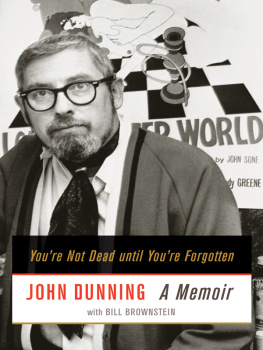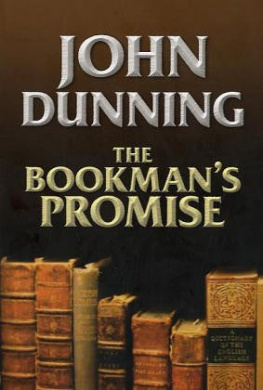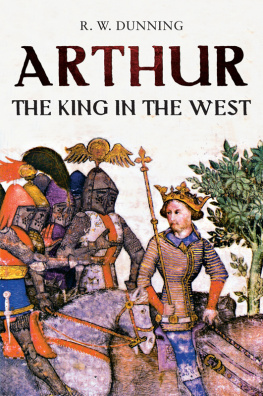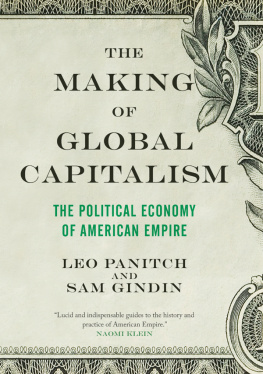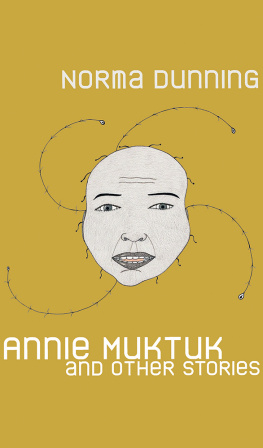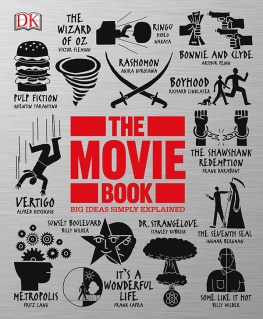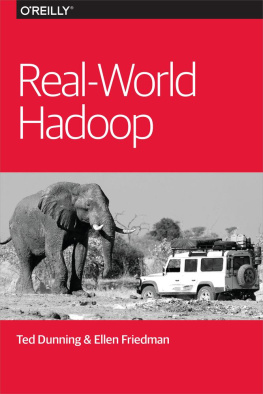
YOURE NOT DEAD UNTIL YOURE FORGOTTEN
Youre Not Dead until Youre Forgotten
JOHN DUNNING A Memoir
with BILL BROWNSTEIN
McGill-Queens University Press
Montreal & Kingston London Ithaca
McGill-Queens University Press 2014
ISBN 978-0-7735-4402-4 (cloth)
ISBN 978-0-7735-9608-5 (ePDF)
ISBN 978-0-7735-9609-2 (ePUB)
Legal deposit third quarter 2014
Bibliothque nationale du Qubec
Printed in Canada on acid-free paper that is 100% ancient forest free
(100% post-consumer recycled), processed chlorine free
McGill-Queens University Press acknowledges the support of the Canada Council for the Arts for our publishing program. We also acknowledge the financial support of the Government of Canada through the Canada Book Fund for our publishing activities.
Library and Archives Canada Cataloguing in Publication
Dunning, John, 19272011, author
Youre not dead until youre forgotten : a memoir / John Dunning ; with Bill Brownstein.
Includes index.
Issued in print and electronic formats.
ISBN 978-0-7735-4402-4 (bound).ISBN 978-0-7735-9608-5 (ePDF).ISBN 978-0-7735-9609-2 (ePUB)
1. Dunning, John, 19272011. 2. Motion picture producers and directors Canada Biography. 3. Screenwriters Canada Biography. 4. Cinpix inc. I. Brownstein, Bill, author II. Title.
PN1998.3.D865A3 2014 | 791.430232092 | C2014-901302-7
C2014-901303-5 |
This book was designed and typeset by studio oneonone in Sabon 10.3/14
In memory of John Dunning
who will never be forgotten.
INTRODUCTION
Bill Brownstein
He helped propel then-unknown Canadian filmmakers like David Cronenberg, Ivan Reitman, Francis Mankiewicz, and Don Carmody to stardom. And the career of Bill Murray soared after the wacky comic was featured in his production of Meatballs, one of the most profitable Canadian movies ever released. Yet Verdun native John Dunning, while unarguably one of this countrys most successful film pioneers, was a reluctant player who always shied away from the limelight.
Some people yearn for the glamour of showbiz. Not Dunning. He was born into it and initially wanted nothing at all to do with it. His dad, Mickey, began in the early 1900s by touring Quebec screening newsreel footage from the trunk of his car. He later owned and operated a string of Montreal movie theatres, where John spent most of his waking hours but not by choice.
When he was thirteen, John was running the candy counter at the family-owned Century Theatre in Ville mard. A few years later, following the death of his father, John was managing the theatre. Not so coincidentally, he developed ulcers and panic attacks at the same time, likely precipitated by the fact that unruly and soused patrons would tear the place apart on weekends. But as Dunning a self-proclaimed sociophobe would later reflect, his fate was sealed. Try as he might, he couldnt escape the business. He loved film; it was the people associated with it who often proved problematic.
One person, however, made all the difference. Dunning hooked up with Andr Link in 1962 to form Cinepix. They produced their first film, Valrie, for eighty thousand dollars; it held the Quebec box office record in Canada until 1995. (To Dunning, the movie was especially significant because it was named for his daughter Valerie, who died in 1986, at the age of twenty-two, in a car accident.) Dunning and Link whether producing, distributing, or writing scripts would soon become the most prominent Canadian movie moguls most had never heard of. And that suited the tandem just fine. Their distribution arm was responsible for bringing Canadian cinephiles such delights as The Piano, Strictly Ballroom, Like Water for Chocolate, and The Crying Game, among hundreds more. Donning their producer caps, these same men, who had been involved with the highly cultivated and poignant Princes in Exile, went in another direction, making low-budget, mainstream movies that ranged from the Snake Eater and Meatballs series to the whip-toting Ilsa: She Wolf of the SS. They were later labeled the Roger Cormans of Canada, in reference to the noted American B-movie master.
In the same way that Corman nurtured talent, Dunning and Link were responsible for giving the likes of Cronenberg, Reitman, Mankiewicz, and Carmody their starts at Cinepix. But the statistic that Dunning and Link were proudest of was that ninety-percent-plus figure of movies made in Quebec. The system does not pay you for artistic success, Dunning relayed in an interview. Were limited to making low-budget movies that entertain, find audiences and recover their costs. Unfortunately, weve never had the budgets to do the high-quality art films. I wish we were 6,000 miles away from the US like the Australians are. Then this business would be healthier.
During their run together, Dunning (who focused more on writing) and Link (whose forte was distribution) produced fifty-nine feature films. They were honoured at the 1993 Genie Awards for their outstanding contributions to the business of filmmaking in Canada. In 2007 they were inducted into the Canadian Film and Television Hall of Fame, and they received Lifetime Achievement Awards at the 2011 Fantasia Film Festival. But most intriguingly, the Toronto Film Critics Association (TFCA) named Dunning the recipient of its 2011 Clyde Gilmour award an honour tinged with all manner of irony for its recipient. I think one would be hard pressed to find a glowing review from Clyde Gilmour for any of Cinepixs productions, cracked Dunning, a few months before his passing at the age of eighty-four, in reference to the Toronto critic and author after whom the award is named. But I think Clyde and I would agree that our films proved that Canadian films could gain international acceptance and recognition.
Though his health was fast deteriorating at the time, Dunning was both stunned by and appreciative of the praise he was receiving from critics and cronies alike when the award was first announced.
John Dunning is a major unsung hero of Canadian cinema, pronounced TFCA president Brian Johnson, the Macleans film critic. Through the filmmakers he nurtured over the years, hes left an indelible signature. This is a recognition that is already long overdue.
John Dunning is the unacknowledged godfather of an entire generation of Canadian filmmakers, offered David Cronenberg, whose early films Shivers and Rabid were produced by Cinepix. I still consider him my movie mentor, and Cinepix my film school. Its thrilling and cathartic for me to see this wonderfully wry, gentle and supportive man finally get the public celebration he deserves.
I would say that John was not only a great mentor to me, but also my real film school, stated Don Carmody, whose producer credits include everything from Cinepixs Meatballs to the acclaimed, searing Qubcois drama Polytechnique to the Oscar-winning musical Chicago. He had incredible patience with us young film makers and treated us with respect beyond our abilities and made us understand the world of commercial film making.
Until his death, Dunning remained engaged creatively. He kept a series of inspirational quotations on a blackboard in his office to keep inspiring and motivating him. Among other projects, he was putting the final touches to a horror film written by Lorenzo Orzari. George Mihalka, orchestrator of the original cult classic My Bloody Valentine for Cinepix, was in discussions to direct.
He was so very passionate and successful in a career he never chose but grew to love, said his son Greg, an ex-Telefilm Canada staffer. While incapacitated in his final year of life, he somehow found the energy to write another screenplay. His signature was giving aspiring young filmmakers and crew a chance to work and gain experience in the film industry.
Next page
